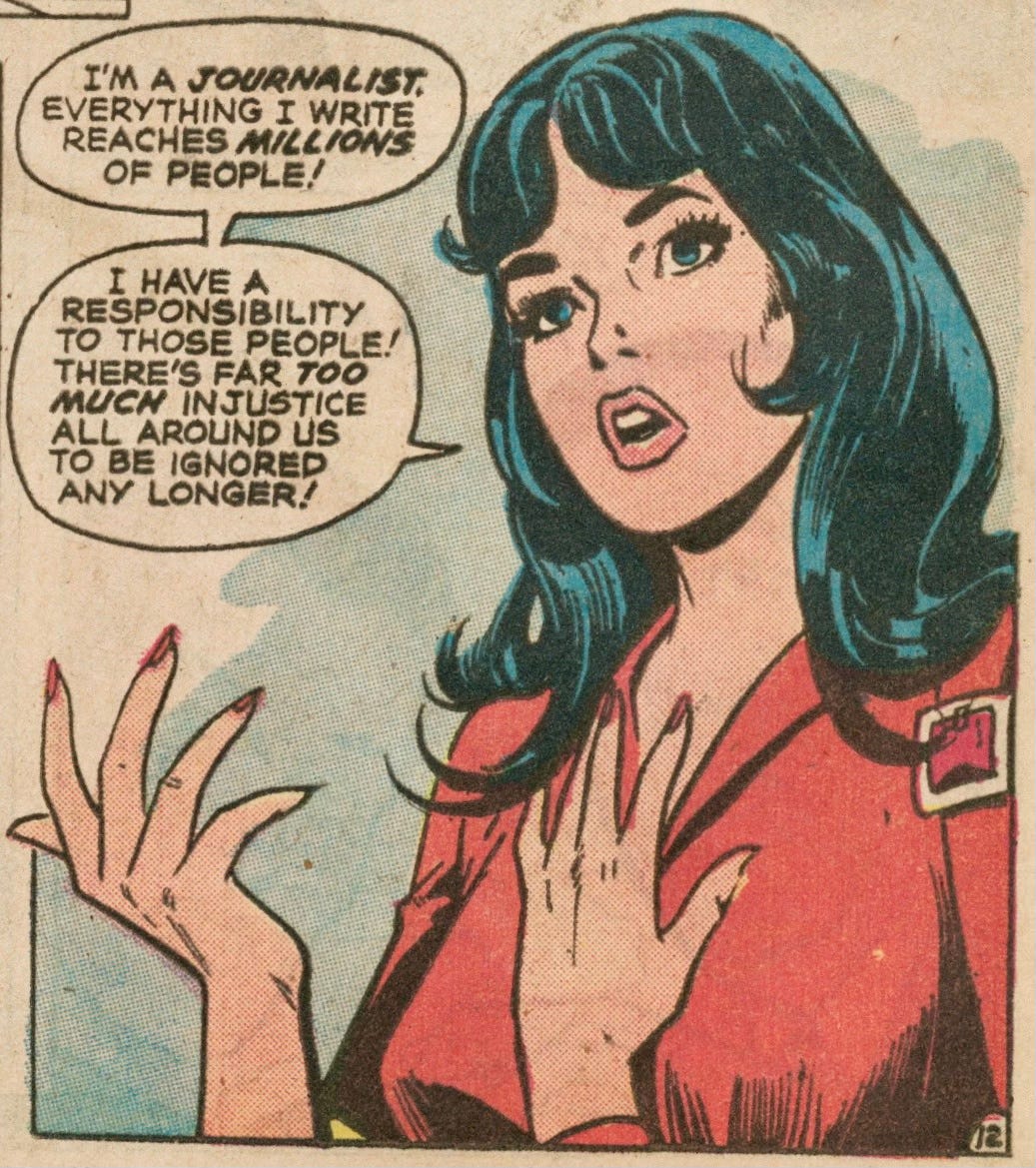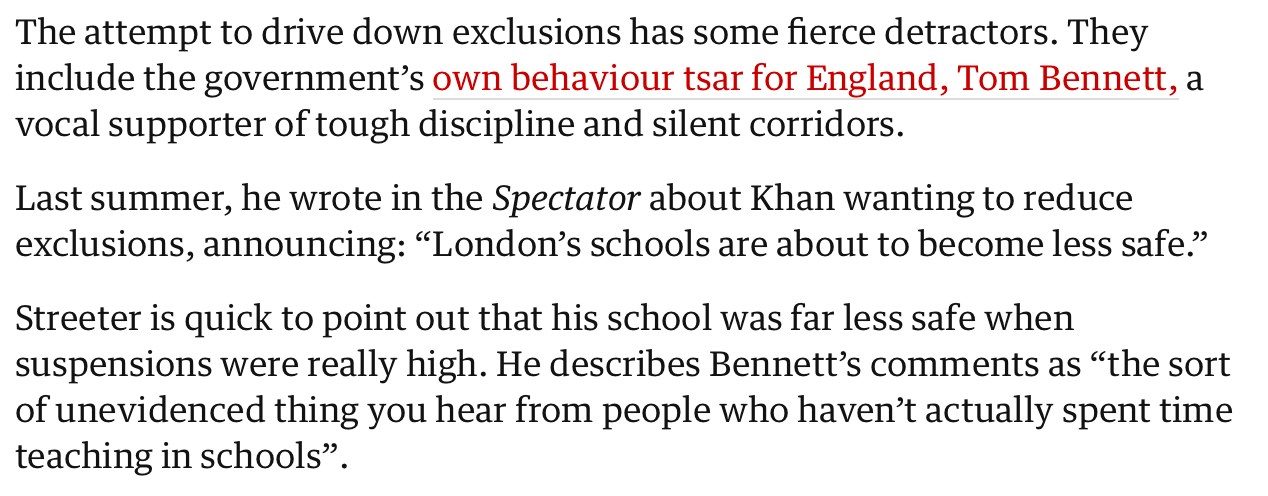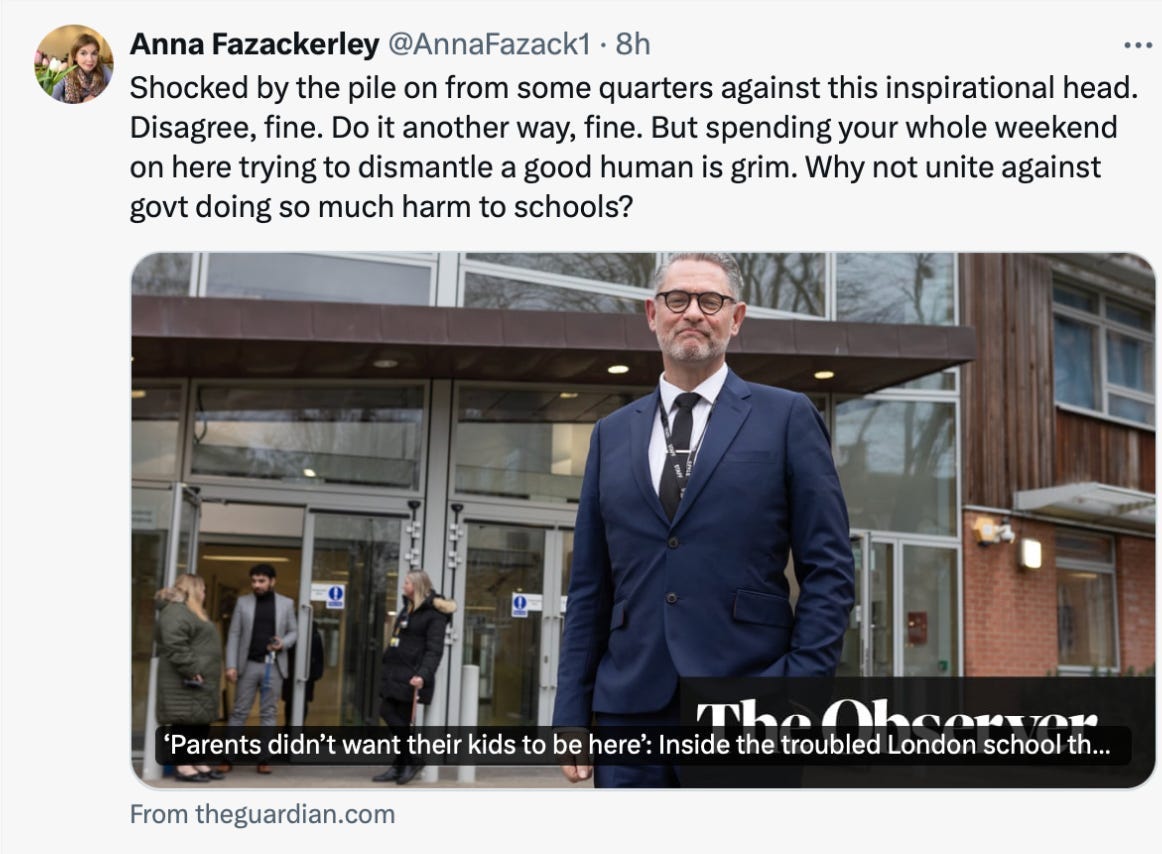How to report badly about schools
Understanding what schools are really like is hard for the outside observer, but fact checking is not
I’ve been working in, and writing about education for decades now, so it’s easy to think you’ve seen it all. But I’ve rarely seen an article as poorly researched and evidenced as the one published in this Saturday’s Observer newspaper. It seems to me it abandons the pretence of being journalism and descends, howling, into full-throated advocacy and activism. (And it mentions me pretty roughly, which if I’m honest, caught my eye in the first place.)
It’s a familiar feel-good story: a school with a troubled past, where misbehaviour and chaos were common, until the efforts of a near-recent inspirational head teacher who came along and healed the land, like a Fisher King, with love. It’s a great story. I won’t name the school or the head here, because running a school is a Sisyphean task at the best of times, and turning around a school facing challenges is like doing it with the slope covered in grease. This isn’t, in some ways, about the school, but how it is being used to grind a political axe.
It’s worth responding to the story being sold in the article, largely because it seems to suggest a scenario that is somewhat at odds with reality. It creates the impression that the school was doing very badly, and then they started to cut exclusions, and then things started to improve. Which would be amazing.
The problem is, that doesn't seem to be evidenced in any way. For a thorough analysis of this, Andrew Old has done the work here.
The reason why this matters is because the idea that behaviour can be resolved in schools by simply reducing things like suspensions and exclusions, is a form of magical thinking that leads people to create environments that are usually much worse for children. The way to reduce exclusions is by reducing the need to exclude, not by simply turning the tap off.
The school appears to be facing some substantial obstacles. Far from not excluding, it appears to still exclude- as many schools have to. Furthermore, it’s school roll has dropped dramatically over the last few years, which means that not only is it a very small secondary, not only does it seems to have become a place that parents do not want to send their children to, but it has become a place with a*higher* rate of exclusion (because of its small population) than the national average. And perhaps more seriously, its progress is hovering at -0.78, which for the non-educator, means that on average kids there achieve 3/4 of a grade less than we would expect, which is well below national averages.
That’s not to knock the school- I’m sure the leader there, like most leaders, is a great person doing their absolute best. They may well be knocking themselves out, slowly bringing it back into shape. But I would suggest avoiding letting a journalist platform the claim that the school was a turnaround success, or use it as a shining example of how to turn schools around by the miracle of not excluding. And of course the head doesn’t actually make this claim. The article is all over the place in its inferences. What is the better, more inclusive way being advocated here? It’s incredibly hard to get a sense of anything the school does that is different from many others.
Why does this matter? because of an odd narrative frame that the whole article relies on: that this school has found a way to improve the school behaviour culture by not excluding. Which is utterly strange, because it does exclude (see above) and what it does now is very close to the kind ot things that I advocate schools should do anyway. The journalist claims that unlike normal, rubbish schools that have isolation rooms for kids that misbehave, this schools has……wait for it, isolation rooms, only this one sometimes does group work, and there are nice posters on the wall. Christ, why had no one else thought of that radical innovation? Instead of excusing children, it….excludes children. It’s so weird. It’s like saying, yes we got rid of table salt ages ago, now we only use NaCl.
There are also some bizarre slurs made about me. The journalist decides to describe me as ‘a vocal supporter of tough discipline and silent corridors.’ Which is a bit of a mischaracterisation.
I think that if schools want to have silent corridors they should be allowed to, but if not then they don’t. That’s not quite the same as advocating them, any more than a zebra crossing advocates crossing the road. An advocate of ‘tough discipline’? I’m not really, unless you mean ‘consistent, predictable consequences and high expectations’ in the same way that people who park on double yellow lines should get consistent consequences. Is that tough? I’d call it having a high standard. I suspect ‘tough’ in this context is intended to mean ‘highly punitive’. Which I am certainly not an advocate of. But you’d have to be familiar with my work to know that.
But the biggest gaffe is when the head describes my views as, ‘The sort of unevidenced thing you hear from people who haven’t spent time teaching in schools,’ which came as a surprise to me, who worked in tough inner city schools in London for over a decade. I’ve visited 950+ schools. I’m a Professor in School Behaviour, written four books on behaviour, and lead national programs of school improvement in school culture. None of which means I am right, but I think I’ve earned the right to claim some level of expertise. I don’t mind a head teacher not knowing that (actually I do, a bit) but a journalist wiring about it for a national? Are there no fact checkers? Is Google banned in the Observer? Are facts whatever we decide? Apparently.
I’m fairly thick skinned by now. I don’t really care when people disagree with me. If you stand for anything, people will attack you, and I desperately want to stand against a system that allows any child to exist in chaos. When you push back against a status quo that says children must never be told off, or reprimanded, or sanctioned, or told no, then you get a lot of knuckle-headed amateurism. That’s par for the course.
What I object to is activist journalism that reaches thousands of people, spreading untruths. You just have to look at some of the response on social media to see that there are quite a lot of people who are perfectly happy to have faith in the Observer as an organ that tells the truth, or at least tries to, who then think that I, and people like me, hate children, and only want to make the little pirates walk the plank. This matters, because a) I have a professional and reputational interest in not being misrepresented, and b) it hurts the chances of schools adopting approaches that will ultimately help them, and the children they serve.
The fundamental duty of a school is to keep children safe. Then, to create a calm environment in which everyone can learn and flourish. Once in a blue moon this will require excluding a student, because not to do so creates an environment that is insufferably violent, or chaotic, or undignified, That isn’t an act of cruelly or child hatred; that’s literally the most loving thing we can do, especially for the children affected by the violence can abuse of the minority of kids who make the lives of others hell. They matter too. I think about them a lot. I think about all of them.
But not, it seems, some activist campaigners. they are oblivious to the reality of schools because they have never worked in one, apart from their own agreeable experiences of schools as a student with affluent and elite demographics. They cannot conceive what it is like to share a room with a child screaming at you to fuck off, or beating you up daily in the toilets. They never will. Believing that schools should never (or hardly) exclude is luxury they can afford, because their beliefs will never cost them a penny, or a second of hardship.
But if your school environment is so chaotic that children are leaving in droves, that the results are cratering to some of the worst in the UK, then this is not evidence of some mysterious and magisterial third way that has never been tried before.
I have nothing but respect and love for people in this school, or any school, who are trying their hardest to make things better for children, I utterly salute and support the head and his team and what he is trying to do, every day, making. difference, or trying to.
But it is irresponsible to platform a school in this condition and claim that it is a) unusual or b) successful. And this is where journalism matters. The author of this banal and error-ridden piece has decided to plant their flag on this hill. Fine. Then do the honourable thing and show us what is different and successful about this example. Because at first, second and third glance, it appears not to be what it is being sold as.
In a surprising moment of candour, the author revealed their motivation on social media:
So the intention here seems clear. This isn’t reporting; this is writing as activism. The point of the piece isn’t to platform what works in schools- the point is to campaign against a disliked political establishment.
I saw precisely no attacks on the head; I did see a lot of push back from people who aren’t easily persuaded by thinly-veiled activism. And I saw a lot of people cheering on the piece who already agree with the types of things it was saying.
Interestingly, despite a long queue of people telling the journalist that the piece was riddled with factual errors, there was no response to their fact checking, apart from ‘Hey, why are you monsters attacking this really lovely guy?’
Which indicates the odd possibility that they are aware of the correct facts, but for some reason choose not to acknowledge or accept them, despite their being incontrovertible. The school is not a paragon of exemplary transformation. It has not demonstrated- yet- a magical turnaround. Exclusions are not particularly low- they are entirely average (or slightly above). Simply deciding not to suspend students, especially ones who may well need to be suspended, is not a sustainable or useful strategy. In fact, in many schools I have seen, it is a strategy that often accompanies a school in behavioural free-fall- although I hope that is not the case here.
I wish them nothing but success. But they should not have been used in this way. This was a really poor story, badly researched and fact-checked, and based on a very weak premise. This isn’t harmless. It damages the perception of why schools need to reluctantly but assertively exclude in a minority of circumstances, and jumps on the equally banal campaigning of other newspapers in this matter. Children’s lives are not fodder for fashionable hand-wringing and performative activism. Try working in challenging schools, and actually help turn them around, and then come back and tell everyone else how to do it. Until then, it is wiser to be cautious in arenas you know little about.
I’ve asked for an apology, and a revision to the piece, especially in its characterisation of me. If that happens, I’ll come back and update this….




